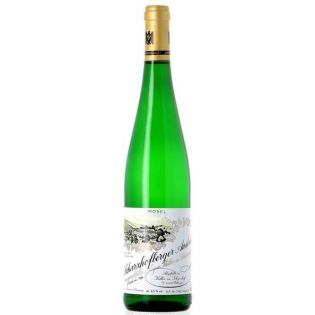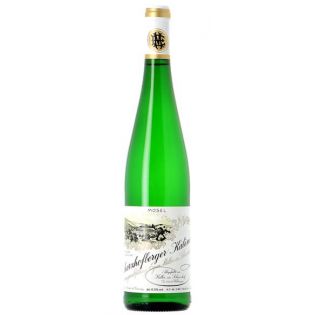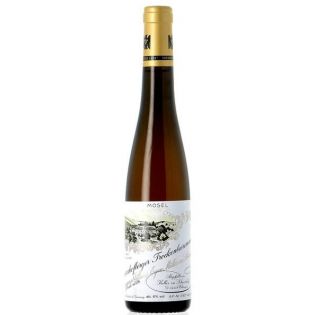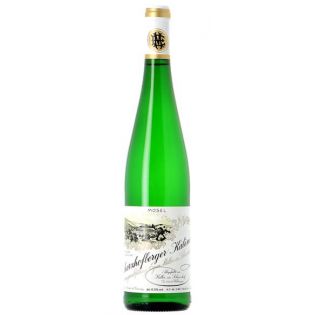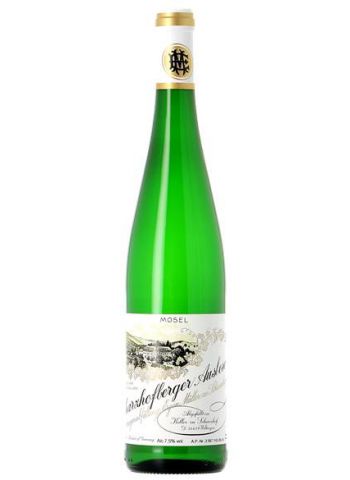
Scharzhofberger Auslese
Certainly in the pantheon of the world's great sweet wines alongside the great Massandra, the Eszencia of Hungary, the ice wines of Inniskillin, the Jurançon of D.Dagueneau, Yquem...
Egon Müller IV shares with the Burgundian Louis Latour the particularity of bearing the same first name as his father and grandfather. This is a family tradition that identifies the estate and the person who manages it. He is the fifth generation to work the Scharzhofberg vineyard, his ancestor Jean-Jacques Koch having created the estate in 1797. This is a historic date: Napoleon launched the Italian campaign, defeated the Pope, ransomed the Vatican and installed the laws of the Republic in the regions he had already conquered, including the nationalisation of the Church's possessions (especially land). This was the case in Mosel and Saarland, now the Land (province) of Rhineland-Palatinate, in Germany.
Genius of intuition
Jean-Jacques Koch bought a national property, a hill, the Scharzberg, which could be translated into old French as the "mountain of essarts", which in our ancient language meant cleared land... It is about twenty hectares suitable for vineyards but not for trade. Isolated from any major communication route, it illustrates perfectly what the agronomist Olivier de Serres said in 1600: "If you are not in a place to sell your wine, what would you do with a large vineyard? The answer in this case was to wait. Did Jean-Jacques Koch have a brilliant intuition? No doubt, because far from everything, at a height of between 200 and 300 metres, in this relatively cold climate, no one thought that the most expensive Riesling wine in the world would be harvested here. Especially since the railway that "opened up" the region only came here in the second half of the 19th century.
A daughter of Koch married a Müller, who gave birth to Egon, the first of the name. But he also had other children, who shared the 20 hectares of vineyards. Today, the original estate covers only 8.5 hectares. But Egon Müller remains the most important owner of Scharzhofberg, even if recently parcels of more or less the same nature have been added to the vineyard, increasing it to 28 hectares... The historic part is composed of schist that has been broken down at depth, where the mother rock is nowhere to be seen. These soils have the particularity of constituting an important water reserve, capable of feeding the vine even during long periods of drought. No jolts, no blockage, a long maturity with cool nights that preserve the aromas. The acidity is also very present, which allows the wines to be balanced and to have a high sugar content, much higher than our Sauternes and Monbazillacs. Sometimes more than 400 grams per litre for alcohol levels of 6°...
The category of the great elegants
But the great advantage of Egon Müller's wines is precisely what sommeliers call "drinkability". It's not a nice word; it sounds more like the cry of a frog with a cold, but it's a good "spoken description", as Françoise Rosay used to say (Le cave se rebiffe). These wines, of great aromatic concentration, rich in sugar, especially the rarest vintages, are not heavy, but rather rank in the category of great elegance, as do Pétrus or Romanée-Conti in another genre. The very great wines are never expressed in force but in delicacy and refinement... In Germany, wines are classified according to their sugar content. To put it simply, what corresponds to our AOCs are called Prädikatswein (special quality wines). Within which, for whites, there are several categories, starting with the dry wines, known as Kabinett; then come the Spätlese (slightly later harvest); then the Auslese (even later), the Beerenauslese and Trockenbeerenauslese. This last category could be translated as "wines from dried berries"...
There was no tradition of such wines in this region. It was Egon Müller, the father of the current owner, who made the first one in 1959, a particularly hot and dry year in Germany but also in France, where this vintage is part of the pantheon in Bordeaux, Alsace and Burgundy. Of course, this bottle is almost impossible to find and would fetch a high price at an auction. This is how Egon Müller sets his prices every year. Not thanks to the price of the 1959, but by relying on the prices obtained by its last harvest offered for sale at a traditional auction which is not far from resembling that of the Hospices de Beaune. Created at the beginning of the 20th century in the city of Trier, the Grosser Ring auctions the wines of Prädikat producers (in appellation), at least those who wish to do so. Very quickly, German fans of Egon Müller's wines began to show up and drove the prices up to heights that would make the winegrowers of Alsace, Layon or Sauternes dream. All the more so as the estate is only offering part of its production for sale. The rest will be parsimoniously marketed at the rate determined by the Grosser Ring...
And to finish More Information
The Estate Egon Müller
The Estate Egon Müller
It's obvious Our engagements
Fair Price
The right price for the entire selection, all year round... + 2% discount in loyalty points on each purchase!
Cutting edge selection
Designed for the amateur, novice to expert, a cutting-edge offer of the best vintages from the best winegrowers, from all regions of France and beyond.
Careful shipping in 24/48h
Your bottles are shipped within 24/48 hours in a reinforced package, in France and in 25 European countries.
2000 Food and wine pairings
Each wine is accompanied by recommendations of service and food-wine pairing


